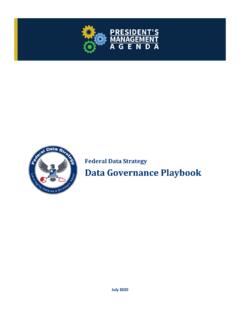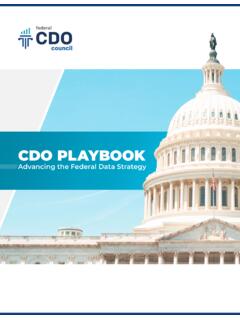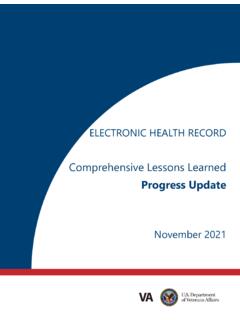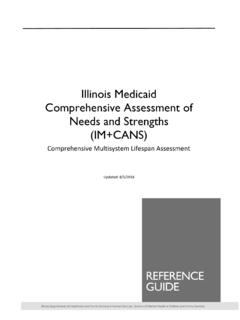Transcription of Federal Data Strategy Data Ethics Framework
1 Federal data Strategy data Ethics Framework Federal data Strategy data Ethics Framework Page 2 Special Thanks to Our Contributors Decisions made with data touch every aspect of American life. The Federal Government uses data to solve problems, develop and deliver services to citizens, defend and secure the nation, and support economic growth. data s benefits and risks are amplified by the expanding capabilities of digital networks, technology systems, algorithms, and computational methods that enable data to be easily collected, combined, manipulated, and shared. The Federal data Strategy , delivered in December 2019, recognized the importance of Ethics in its founding principles. When the Federal data Strategy team created the 2020 Action Plan,1 they tasked the General Services Administration (GSA) with developing a data Ethics Framework ( Framework ) in Action 14 to help Federal employees, managers, and leaders make ethical decisions as they acquire, manage, and use data .
2 To achieve the goal of developing a useful data Ethics Framework for the Federal Government, GSA sought input from a diverse set of stakeholders to maximize the Framework s value and utility across the Federal enterprise. To lead the Framework s development, GSA formed an interagency team comprised of 14 government leaders from across government with expertise in statistics, public policy, evidence-based decision making, privacy, and analytics. In addition, GSA received input on the Framework from the Chief data Officer (CDO) Council, Interagency Council on Statistical Policy (ICSP), and the Federal Privacy Council (FPC). The resulting Framework will help guide the ethical acquisition, management, and use of data for years to come. Federal data Strategy data Ethics Framework Page 3 data Ethics Framework Development Team Trey Bradley, Strategic data Initiatives Program Manager, Office of Shared Solutions & Performance Improvement, General Services Administration (Development Lead)
3 Ken Ambrose, Senior Advisor for the CDO Council, Office of Government-wide Policy, General Services Administration Maya Bernstein, Senior Advisor for Privacy Policy, Office of the Secretary for Planning & Evaluation, Department of Health & Human Services Ivan DeLoatch, Executive Director, Federal Geographic data Committee, Geological Survey, Department of the Interior Dave Dreisigmeyer, Interim Deputy Chief data Officer, Office of the Under Secretary for Economic Affairs, Department of Commerce Jeffrey Gonzales, Research Mathematical Statistician, Economic Research Service, Department of Agriculture Chris Grubb, Chief data Scientist, Center for Analytics, Department of State Lisa Haralampus, Director of Records Management Policy and Outreach, Office of the Chief Records Officer, National Archives and Records Administration Michael Hawes, Senior Advisor for data Access and Privacy, Census Bureau, Department of Commerce Barry Johnson, Acting Chief, Research and Analytics Office, Internal Revenue Service, Department of the Treasury Brandon Kopp, Research Psychologist, Bureau of Labor Statistics, Department of Labor John Krebs, Chief Privacy Officer, Federal Trade Commission Justin Marsico, Chief data Officer, Deputy Assistant Commissioner, Bureau of the Fiscal Service, Department of the Treasury Daniel Morgan, Chief data Officer, Department of Transportation Katerine Osatuke, Research Director, Veterans Health Administration National Center for Organization Development, Department of Veterans Affairs Eileen Vidrine, Chief data Officer, Air Force, Department of Defense With special thanks for the consistent support and meaningful contributions of the CDO Council, ICSP, and FPC.
4 Federal data Strategy data Ethics Framework Page 4 data Ethics Tenets Federal data Ethics Tenets help Federal data users make decisions ethically and promote accountability throughout the data lifecycle as data are acquired, processed, disseminated, used, stored and disposed. Regardless of data type or use, those working with data in the public sector should have a foundational understanding of the data Ethics Tenets. Federal leaders should also foster a data Ethics -driven culture and lead by example. The data Ethics Tenets are: 1 - Uphold applicable statutes, regulations, professional practices, and ethical standards. Existing laws reflect and reinforce Ethics . Therefore, data leaders and data users should adhere to all applicable legal authorities. Legal authorities often address historic situations and issues and may not keep pace with the evolving world of data and technology. Organizational leaders are encouraged to maintain up-to-date, comprehensive ethical standards regarding data use and staff are responsible for learning and applying agency guidance appropriately.
5 2 - Respect the public, individuals, and communities. data activities have the overarching goal of benefiting the public good. Responsible use of data begins with careful consideration of its potential impacts. data initiatives should include considerations for unique community and local contexts and have an identified and clear benefit to society. 3 - Respect privacy and confidentiality. Privacy and confidentiality should always be protected in a manner that respects the dignity, rights, and freedom of data subjects. In this context, privacy is the state of being free from unwarranted intrusion into the private life of individuals, and confidentiality is the state of one s information being free from inappropriate access and misuse. An essential objective of privacy and confidentiality protection is to minimize potential negative consequences through measures such as comprehensive risk assessments, disclosure avoidance, and upholding data governance standards.
6 data activities involving individual privacy should align with the Fair Information Practice Principles (FIPPs). 4 - Act with honesty, integrity, and humility. All Federal leaders and data users are expected to exhibit honesty and integrity in their work with data , regardless of job title, role, or data responsibilities. Federal leaders and data users should not perform or condone unethical data behaviors. When sharing data and findings, personnel should report information accurately and present any data limitations, known biases, and methods of analysis that apply. It should also be recognized that no dataset can fully represent all facets of a person, community, or issue. Federal leaders and data users are expected to have humility when presenting data , be open to feedback, and when possible invite discussion with the public. In addition, Federal data users should accurately represent their abilities when working with data . 5 - Hold oneself and others accountable.
7 Accountability requires that anyone acquiring, managing, or using data be aware of stakeholders and be responsible to them, as appropriate. Remaining accountable includes the responsible handling of classified and controlled information, upholding data use agreements made with data providers, minimizing data collection, informing individuals and organizations of the potential uses of their data , and allowing for public access, amendment, and contestability to data and findings, where appropriate. 6 - Promote transparency. Individuals, organizations, and communities benefit when the ethical decision-making process is as transparent as possible to stakeholders. Transparency depends on clear communication of all aspects of data activities and appropriate engagement with data stakeholders. Promoting transparency requires engaging stakeholders through easily accessible feedback channels and providing timely updates on the progress and outcomes of data use. 7 - Stay informed of developments in the fields of data management and data science.
8 Advanced technologies provide great benefit to the public sector, but should be deployed with a commitment to accountability and risk mitigation. While traditional data use and analysis can introduce bias, emerging systems, technologies, and techniques require additional awareness and oversight because they can increase opportunities for bias. It is critical to remain informed of developments in the fields of data management and data science, especially as advanced methods impact future data collection, management, and use. In addition, new data innovations ( , systems, solutions, computational methods) emerge every day, increasing the importance for Federal leaders and employees working with data to keep abreast of market innovations and learn how to ethically use new methods. Note: The Framework is a living resource and to be updated by the CDO Council and ICSP every 24 months. Federal data Strategy data Ethics Framework Page 5 Content Overview of data Ethics 6 6 6 Benefits of data 7 About the data Ethics 8 8 Audience.
9 8 data Ethics Defined .. 9 Application of data Ethics .. 9 data Ethics Tenets .. 10 1. Uphold Applicable Statutes, Regulations, Professional Practices, and Ethical 11 2. Respect the Public, Individuals, and Communities .. 12 3. Respect Privacy and Confidentiality .. 13 4. Act with Honesty, Integrity, and 15 5. Hold Oneself and Others Accountable .. 17 6. Promote 19 7. Stay Informed of Developments in the Fields of data Management and data Science .. 20 data Ethics Tenets in 22 Use Cases .. 22 1. Use Case: Artificial Intelligence & Bias .. 22 2. Use Case: Dissemination & Impacts .. 25 End Notes .. 28 Federal data Strategy data Ethics Framework Page 6 Overview of data Ethics Framework Background Although sometimes described as the new oil, because of the way data , and data science, are revolutionizing society just as fossil fuels did earlier, data have unique properties, leading to correspondingly unique ethical Such considerations do not permit simple formulaic answers, since these must be context-dependent and dynamic.
10 Instead, solutions must be principles-based, with higher-level considerations guiding decisions in any particular context. - David J. Hand, Hand Writing: Right, legitimate and proper? The new world of data ethics2 The United States Federal Government is one of the biggest producers and users of data in the world. The exchange of information or data with government is necessary for regular tasks, such as renewing a passport, signing up for public assistance programs, and filing taxes. While Americans prize their personal privacy, they are also willing to give information about themselves if it drives a service or concrete public benefit, such as sharing location data to support emergency responders. Similar to entities worldwide, the functions of the Federal Government rely on data for daily operation, management, and improvement. The ways in which data are collected, linked, analyzed, and shared present tremendous opportunities for government. However, these opportunities are accompanied by significant risks sometimes unforeseen to the individuals and communities the government serves.








